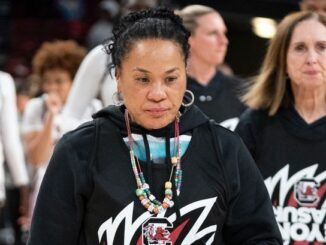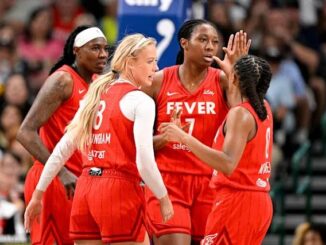
TAMPA, Fla. — Paige Bueckers, Hailey Van Lith, and Azzi Fudd have all turned to mental health professionals at some point to manage the mounting pressures of college basketball.
The demands on student-athletes stem from high expectations, social media scrutiny, sports betting, the transfer portal, and the emotional toll of recovering from injuries. Unlike in past generations, today’s athletes are more willing to seek professional support, breaking the stigma around mental health care.
“There’s been an increased demand for services, and more student-athletes are using them,” said Ashley Harmon, director of Clinical Behavioral Health at Texas. “This generation is much more open to seeking help, whether it’s for anxiety, depression, relationships, or navigating dynamics with coaches and teammates.”
While the exact number of athletes seeing mental health professionals remains unclear, many have spoken publicly about their experiences. Support from coaches, teammates, and family is invaluable, but sometimes an external, unbiased perspective is necessary.
Bueckers and Fudd, both of whom have endured season-ending injuries at UConn, credit sports psychologists with helping them through their recoveries.
“It’s like having a grounding point someone you can talk to without fear of judgment,” Bueckers said. “They help calm your nerves, shift your focus, and ultimately guide you to be the best version of yourself.”
Van Lith’s Wake-Up Call
Van Lith’s decision to prioritize mental health was influenced by the tragic passing of Stanford soccer player Katie Meyer, who died by suicide in 2022.
“I knew I needed help after that,” Van Lith said. The TCU guard has since worked with a sports psychologist who also functions as a general therapist.
Reflecting on her journey, Van Lith noted, “I was only 19 when I first faced these challenges, and I didn’t know how to handle them. Now, I’ve matured and learned a lot.”
After beginning her career at Louisville, transferring to LSU, and eventually landing at TCU, Van Lith has navigated the emotional toll of multiple transitions one of the many stressors that mental health professionals help athletes manage.
The Toll of Injury and the Role of Confidential Support
Texas guard Rori Harmon, unrelated to Ashley Harmon, also faced mental hurdles after tearing her ACL in December 2023. Though she didn’t consult a sports psychologist, she emphasized that rehab is “mentally exhausting” and “not something you can do alone.”
UCLA’s Lauren Betts, who has helped lead the Bruins to their first NCAA Final Four, has also been open about her mental health struggles.
Ashley Harmon’s team at Texas assists athletes with common challenges like overcoming mental blocks and injury recovery, but she has noticed a growing focus on off-the-court issues.
“Social media, politics, COVID all of it has heightened mental health awareness,” she said.
The Stress of the Transfer Portal
Another rising concern for student-athletes is the transfer portal, which can be an emotional and logistical challenge.
“We provide a space for athletes to talk before making decisions,” Harmon explained. “Transferring is stressful. Do you leave a familiar place to start over somewhere new?”
With the increasing need for support, more schools are expanding mental health resources for student-athletes.
“We were one of the first to bring in a part-time mental health practitioner,” Harmon said. “Having dedicated professionals to help student-athletes navigate stress is essential.”
Perhaps most importantly, these mental health services offer confidentiality something rare for athletes constantly in the public eye.
“With their lives under a microscope, it’s crucial to have a private space where they can talk freely, separate from coaches, teammates, academics, and parents,” Harmon added.



Be the first to comment